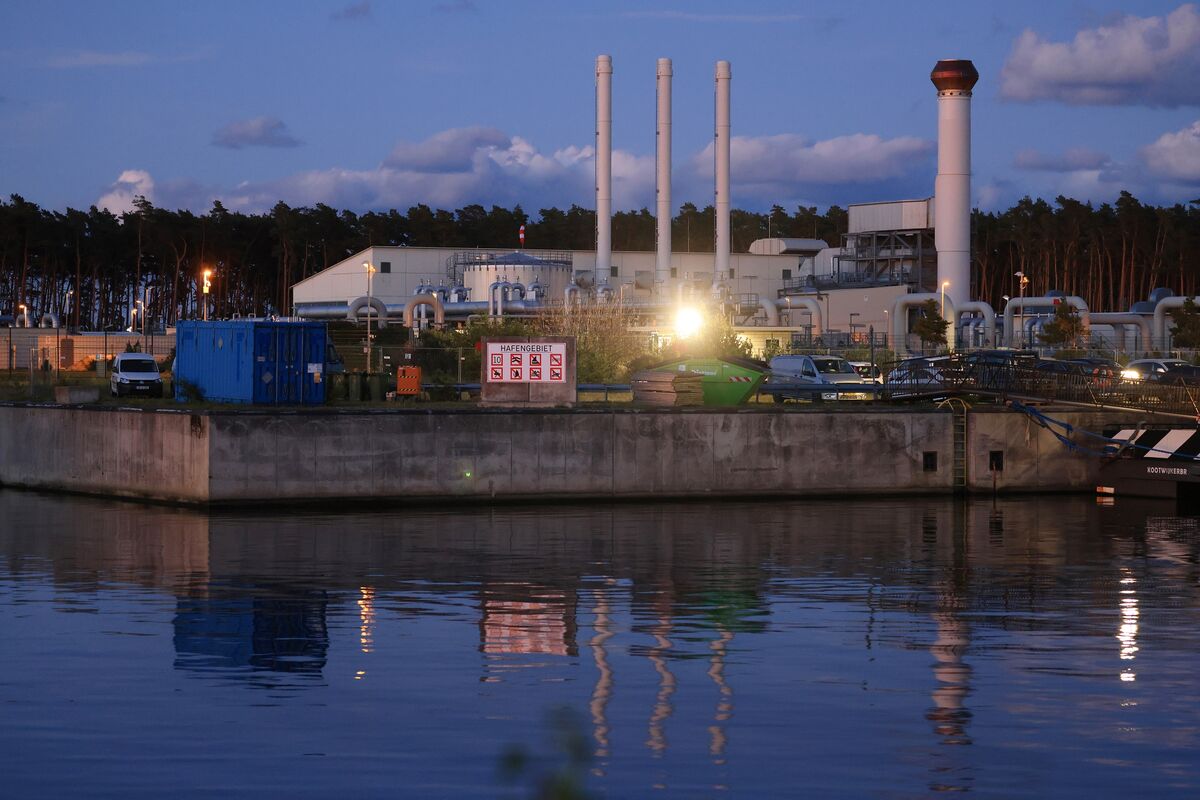German SPD Rejects Russian Gas Import Resumption

Table of Contents
<p>The German Social Democratic Party (SPD), currently leading the German government, has definitively rejected any resumption of Russian gas imports. This decision, made against the backdrop of the ongoing war in Ukraine, carries significant weight for Germany's energy security and its geopolitical positioning. This article will analyze the reasons underpinning the SPD's stance and explore the broader ramifications of this crucial choice.</p>
<h2>SPD's Rationale for Rejecting Russian Gas</h2>
<h3>Moral and Ethical Considerations</h3>
<ul> <li>Continued reliance on Russian gas directly funds Putin's war machine, providing crucial financial resources for the ongoing conflict in Ukraine.</li> <li>Supporting the Russian economy through gas purchases undermines the effectiveness of international sanctions imposed to pressure Russia to end hostilities.</li> <li>Germany has a moral obligation to stand in solidarity with Ukraine and actively demonstrate its commitment to supporting the country against Russian aggression.</li> </ul> <p>The SPD has consistently emphasized its ethical concerns in public statements. Chancellor Scholz and other leading SPD members have repeatedly highlighted the incompatibility of continuing gas imports with Germany's moral and political support for Ukraine. This stance reflects a growing consensus within German society that supporting Russia economically is unacceptable given the ongoing war crimes.</p>
<h3>Security Concerns and Energy Independence</h3>
<ul> <li>Germany's heavy reliance on a single supplier, Russia, creates significant vulnerability in its energy supply chain. This dependence leaves Germany susceptible to political pressure and manipulation.</li> <li>Diversifying energy sources is crucial for strengthening Germany's energy security and reducing its susceptibility to future disruptions from a single supplier.</li> <li>Achieving energy independence is a central long-term strategic goal for the SPD, aiming to safeguard Germany against future energy crises and geopolitical blackmail.</li> </ul> <p>The SPD's rejection of Russian gas reflects a broader strategic shift towards energy independence. The party acknowledges the inherent risks of relying on a single supplier, particularly one engaged in aggressive military actions. This long-term vision necessitates substantial investment in renewable energy and a comprehensive plan for diversifying energy sources.</p>
<h3>Public Opinion and Political Pressure</h3>
<ul> <li>Public opinion polls consistently show strong support within Germany for maintaining sanctions against Russia, including the cessation of gas imports.</li> <li>The SPD faces significant domestic political pressure to maintain a firm stance against Russia and demonstrate unwavering support for Ukraine.</li> <li>Any perceived wavering on this issue could have significant electoral consequences for the SPD, impacting its popularity and public trust.</li> </ul> <p>The SPD’s decision is not made in a vacuum. The party is acutely aware of the public mood and the strong anti-Russian sentiment prevalent across German society. Maintaining a tough stance on Russian gas imports aligns with public expectations and helps solidify the SPD's commitment to Ukraine's cause.</p>
<h2>Economic Impacts and Alternatives</h2>
<h3>Short-Term Economic Challenges</h3>
<ul> <li>Rejecting Russian gas will inevitably lead to higher energy prices for German consumers and businesses.</li> <li>Increased energy costs will contribute to inflationary pressures, potentially impacting the overall economic health of the country.</li> <li>Energy-intensive German industries may face significant challenges, leading to potential job losses and economic slowdown in certain sectors.</li> </ul> <p>The short-term economic impact of foregoing Russian gas is undeniable. The German government acknowledges the potential for increased energy costs and is actively working on mitigation strategies to minimize the negative consequences on citizens and businesses. Support packages and economic stimulus measures are being considered to address the potential economic fallout.</p>
<h3>Long-Term Energy Transition Strategy</h3>
<ul> <li>The German government is making significant investments in renewable energy sources, such as solar, wind, and geothermal power.</li> <li>Energy efficiency measures are being implemented across various sectors to reduce overall energy consumption and improve energy security.</li> <li>Germany is actively diversifying its gas supply chains, seeking alternative sources from countries such as Norway, Qatar, and the Netherlands.</li> </ul> <p>The rejection of Russian gas is intrinsically linked to Germany's long-term energy transition strategy. The government is accelerating its investment in renewable energy and implementing energy-saving measures to achieve greater independence and resilience in its energy system.</p>
<h2>Geopolitical Implications of the Decision</h2>
<h3>EU Solidarity and International Relations</h3>
<ul> <li>The SPD's stance reinforces EU solidarity on sanctions against Russia, demonstrating a united front against Russian aggression.</li> <li>Relations with Russia are undoubtedly strained, but the SPD prioritizes maintaining strong alliances with other Western allies in the face of Russian aggression.</li> <li>Germany's decision aligns with the broader international effort to isolate Russia diplomatically and economically.</li> </ul> <p>The SPD's decision has significant ramifications for the geopolitical landscape. It strengthens the EU's unified stance against Russia and demonstrates Germany’s commitment to collective action in the face of international conflict. This approach aims to deter further Russian aggression and support Ukraine's defense.</p>
<h3>Impact on the Ukraine War</h3>
<ul> <li>Cutting off Russian gas revenue weakens Russia's financial capabilities, potentially limiting its ability to sustain its military operations.</li> <li>The decision is a clear demonstration of Western support for Ukraine and its fight for sovereignty and territorial integrity.</li> <li>While the direct impact on the duration of the conflict is difficult to predict, the move undoubtedly contributes to undermining Russia's war effort.</li> </ul> <p>The SPD’s decisive action has direct and indirect impacts on the conflict in Ukraine. By limiting Russia's financial resources and demonstrating unwavering support for Ukraine, Germany plays a crucial role in the ongoing efforts to end the war.</p>
<h2>Conclusion</h2>
<p>The German SPD's unwavering rejection of resuming Russian gas imports underscores a firm commitment to ethical principles, energy security, and solidarity with Ukraine. While this decision presents short-term economic challenges, it reflects a long-term strategy aimed at achieving energy independence and bolstering Germany's geopolitical position. The economic consequences are being actively addressed through diversification and renewable energy investments, positioning Germany for a more secure and sustainable energy future.</p>
<p><b>Call to Action:</b> To remain informed about the evolving situation concerning German energy policy and the ongoing discussions surrounding Russian gas imports, continue to follow our coverage on the German SPD’s position and the broader ramifications of this pivotal decision. Learn more about the future of German energy independence and the persistent efforts to eliminate Germany's reliance on Russian gas.</p>

Featured Posts
-
 Doktorluk Hayalinden Boks Ringine Bir Sporcunun Yolculugu
Apr 30, 2025
Doktorluk Hayalinden Boks Ringine Bir Sporcunun Yolculugu
Apr 30, 2025 -
 Ryan Cooglers Take On The X Files Insights From Gillian Anderson And Chris Carter
Apr 30, 2025
Ryan Cooglers Take On The X Files Insights From Gillian Anderson And Chris Carter
Apr 30, 2025 -
 Kamala Harris Political Plans A Timeline
Apr 30, 2025
Kamala Harris Political Plans A Timeline
Apr 30, 2025 -
 Amanda Owen Breaks Silence On Heartbreaking Discovery At Ravenseat
Apr 30, 2025
Amanda Owen Breaks Silence On Heartbreaking Discovery At Ravenseat
Apr 30, 2025 -
 Black Sea Oil Spill Impacts And Beach Closures In Russia
Apr 30, 2025
Black Sea Oil Spill Impacts And Beach Closures In Russia
Apr 30, 2025
Latest Posts
-
 Bartlett Texas Fire Leaves Two Structures As Total Losses Under Red Flag Conditions
May 01, 2025
Bartlett Texas Fire Leaves Two Structures As Total Losses Under Red Flag Conditions
May 01, 2025 -
 Red Flag Warning Fuels Devastating Bartlett Texas Fire Two Structures Lost
May 01, 2025
Red Flag Warning Fuels Devastating Bartlett Texas Fire Two Structures Lost
May 01, 2025 -
 Combating Homelessness Prince Williams Scottish Crusade Includes Meeting With Gail Porter
May 01, 2025
Combating Homelessness Prince Williams Scottish Crusade Includes Meeting With Gail Porter
May 01, 2025 -
 Prince William And Gail Porter Unite Against Homelessness In Scotland
May 01, 2025
Prince William And Gail Porter Unite Against Homelessness In Scotland
May 01, 2025 -
 New Partnership For Prince William And Kates Initiative
May 01, 2025
New Partnership For Prince William And Kates Initiative
May 01, 2025
